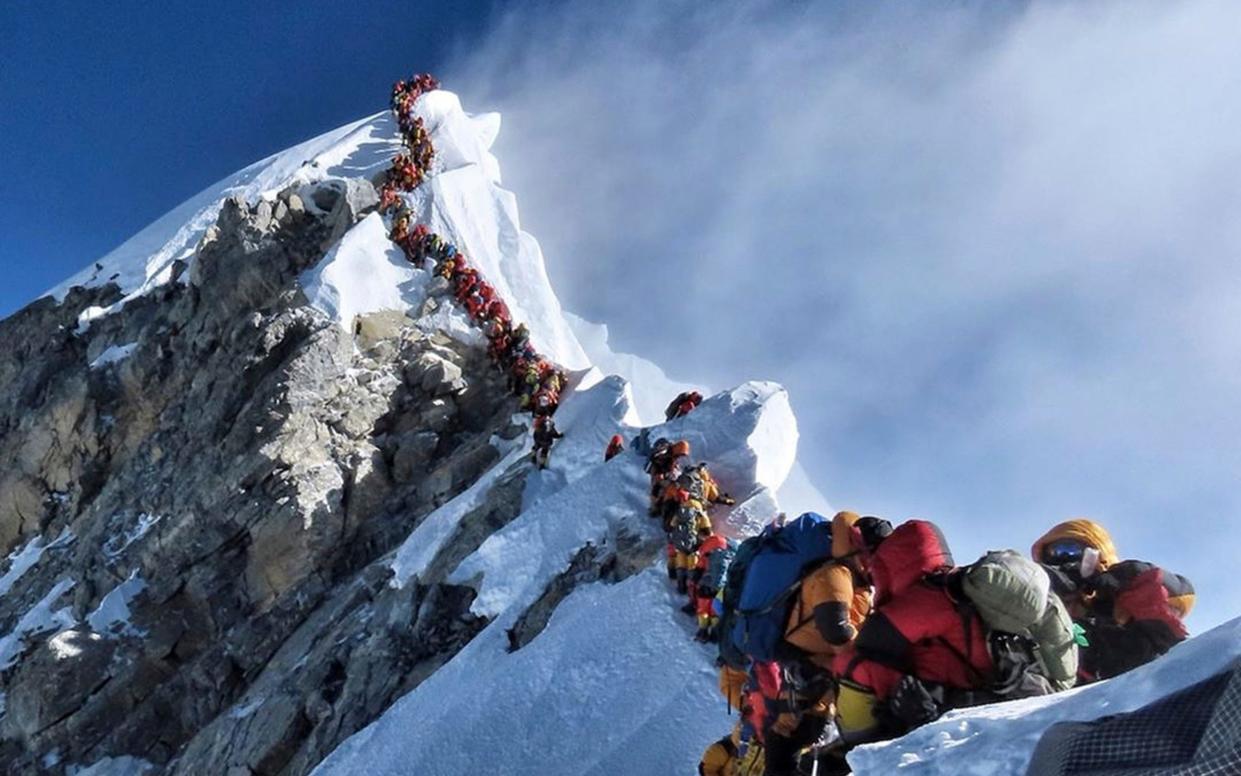Mount Everest climbers to use poo bags in clean up initiative

Alongside their ice axes, fleeces and food, intrepid climbers attempting Mount Everest will soon have to find room in their rucksacks for another item – poo bags.
In an attempt to clean up the world’s highest peak, authorities in Nepal have decreed that climbers must do their business in a bag and then take it back down the mountain with them.
The bags are to be bought at Everest base camp and will be “checked upon their return”, officials say, as they try to tackle the unsightly and unhygienic problem of climbers relieving themselves in the open, sullying the environment.
The new initiative is being introduced in the lead up to the main climbing season on Everest, which lasts from March until May.
Each year, around 600 people attempt to climb the 29,029 ft mountain, spending weeks in the area as they acclimatise.
While there are extensive toilet facilities at Everest base camp, the problem begins when climbers start heading for the summit.
Some dig holes for their waste but others simply leave it on rocks, snow and ice. The extreme temperatures on the mountain mean excrement does not fully degrade.
‘Our mountains have begun to stink’
Mingma Sherpa, the chairman of Pasang Lhamu rural municipality, which covers much of the Everest region, told the BBC: “We are getting complaints that human stools are visible on rocks and some climbers are falling sick. This is not acceptable and erodes our image.
“Our mountains have begun to stink.”
Between camp one, at the base of Everest, and camp four, towards the summit, there are estimated to be around three tons of human excrement, according to Sagarmatha Pollution Control Committee.
Chhiring Sherpa, the chief executive of the organisation said: “Half of that is believed to be in South Col, also known as camp four.
“Waste remains a major issue, especially in higher up camps where you can’t reach.”
Tim Mosedale, a British expedition leader who has reached the summit of Everest seven times, said he welcomed the introduction of poo bags but questioned how the scheme would be organised and enforced.
“I think it’s good that it’s being broached as a subject, it’s been a long time coming. But I do have some concerns.”
“One is that some clients will not want to carry their own poo up and down the mountain. But it will be very difficult to ask the sherpas - these are guys who are often acclaimed mountaineers and I think they would see it as demeaning. So the responsibility will have to lie with the client.”
It is a problem that definitely needs addressing, he said. In the camps leading up to the summit of Everest, some operators provide toilet tents for their clients but many expect them to fend for themselves.
“So people go behind a rock or next to a little crevasse, anywhere they can get their trousers down in private,” said Mr Mosedale, who has 20 years’ experience mountaineering in Nepal.
In recent years there have been a number of clean-up campaigns on Everest, but as soon as rubbish is removed, more climbers arrive.
Last year, Nepal issued a record 478 climbing permits for the mountain, bringing more than 1,500 climbers, guides and support staff to the area.
Jonathan Reilly, director of the British Expedition Company, which organises treks to Everest base camp, said: “The waste on Everest is ridiculous.
“The question I have is, will climbers bring the poo bags back down the mountain or will they just discard them up there, a bit like dog walkers throwing away plastic bags of dog poo? That would be worse than the current situation because the bags will make it impossible for the waste to biodegrade.
I suspect there will be some climbers who use the bags and then dump them rather than bring them down the mountain.”
‘El Crap’
The Sagarmatha Pollution Control Committee is buying around 8,000 poo bags from the US and they will be distributed to the climbers, sherpas and support staff who start congregating in the region this season.
Each person will receive two bags each on the basis that they can be used several times. The bags contain chemicals that solidify the human waste and render it largely odourless.
The plastic containers are often known as WAG bags, with the acronym standing for Waste Alleviation and Gelling.
One commercially available option is marketed as the Toilet-to-Go: Anywhere, Anytime.
Another, aimed at climbers, is called El Crap – a play on El Cap, the nickname for El Capitan, the sheer-sided granite monolith in Yosemite National Park that featured in the film Free Solo.
The plan’s success will be determined by whether climbers are checked for used poo bags upon return after their attempt on the summit.
Mr Mingma admitted that enforcement of clean-up initiatives had been lax in the past but said this time would be different. “We will run a contact office and make sure our new measures, including making climbers bring back their excrement, are implemented.”
Climbers in other parts of the world already use poo bags, from the US to Antarctica. In a popular climbing area of British Columbia, they are provided for free. Information boards tell climbers “Take it, use it, pack it, bin it.”
If the poo bag project goes well on Everest, it could be extended to other mountains in the Himalaya, Nepalese officials said.

